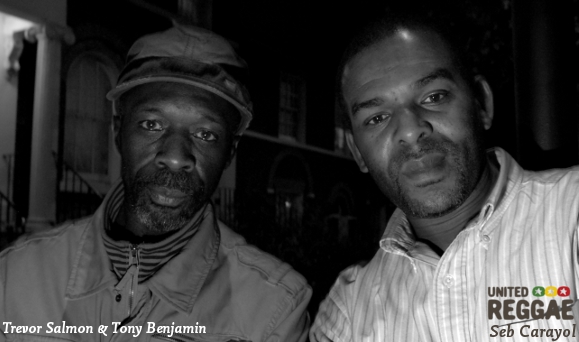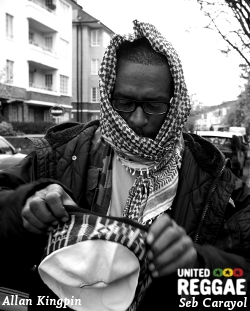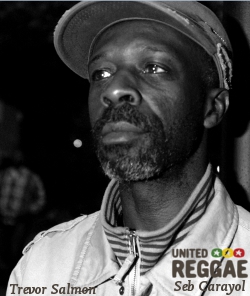Articles about reggae music, reviews, interviews, reports and more...
Interview: Reggae Regular (Part 3 - The Other Side of The Story)
- Home
- Articles
- Interviews
- Interview: Reggae Regular (Part 3 - The Other Side of The Story)

Interview: Reggae Regular (Part 3 - The Other Side of The Story)
"Last time we played together was maybe 1981, when we came back from Germany. Original Regulars"
Sampler
You know how the saying goes : there's always two sides to a story. Following Reggae Regulars' Patrick Donegan, Bryan Campbell, Patrick Johnson and George Flee Clarke interview, it only seemed fair to listen to what founding Reggae Regular members Tony Benjamin (lead singer) and Trevor Salmon (bass/lead) had to say about UK's tremendously influential roots group's career. This interview dates back to November 2007, as the duet, plus original member Allan Kingpin, was toying with the idea of reforming the original band.

How did the three of you meet?
Tony Benjamin: Me and Trevor we were living in the same area, while Allan Kingpin was living in Brixton. Trevor introduced me to the music.
Trevor Salmon: I knew he could sing. I invited him down to have a listen, he liked what was going on you know, and thas what he really wanted to do. Castro Brown is my cousin, we’re related. It so happened that there was a band that Castro Brown used to use in Paddington called Davrock, before Reggae Regular’s time. I was 14 at the time, and the only boy in there. There was nobody of stature in there, they were just known as a backing band, they were doing a lot of jamaican artists, Gregory Isaacs.
I was touring but I was really really young, so I started seeking more local people to my surroundings, such as Dennis Bovell, he had been a good mate, for a long time. And so we started to rehearse with a smaller band in Clapham. It was kind of around that time that Tony got introduced around.
Tony Benjamin: That’s right. Cause I came later didn’t I? When you guys were doing what you were doing.
Trevor Salmon: And around that time Alan got introduced too.
Tony Benjamin: What happened was that the band, they had a girl that was singing, this is before Regulars. Shirley. What happened to her?
Trevor Salmon: The band was growing, we were changing members as we were rehearsing. We already had Errol Francis, the original drummer for Reggae Regular, Tony was coming in, Kingpin was around at the same time. We had to chamge the format when Tony came in.
Tony Benjamin: When I came in it totally changed, it was now a proper band. Before me it was a compilation of different stuff. When I came along it just went to rough stuff, one way. And that was it
Trevor Salmon: And then George Flea Clarke came in.
 On the first version of Where Is jah, that was never released, we had Frankie from the Chosen Few and Dennis Brown doing the backing vocals!
On the first version of Where Is jah, that was never released, we had Frankie from the Chosen Few and Dennis Brown doing the backing vocals!
When did you start calling yourselves Reaggae Regulars, and was it first Regular or Regulars?
Tony Benjamin: Castro Brown. He named us that because we became a backing band now. For the Morwells, for…
It was just the musicians. I wasn’t playing instruments yet, I picked guitar later. Me and Kingpin were upfront all the time, and that was it, doing the vocals.
Which one was exactly the first tune you recorded?
 Tony Benjamin: It was Where Is Jah, innit? With Castro Brown, when Dennis Brown recorded Wolves and Leopards, remember? The first version, which is about the same version than the Greensleeves one, but was never released, I don’t know if it was better or not. Probably more raw. Frankie from the Chosen Few and Dennis, came in for the backing vocals. That was in 1976.
Tony Benjamin: It was Where Is Jah, innit? With Castro Brown, when Dennis Brown recorded Wolves and Leopards, remember? The first version, which is about the same version than the Greensleeves one, but was never released, I don’t know if it was better or not. Probably more raw. Frankie from the Chosen Few and Dennis, came in for the backing vocals. That was in 1976.
And then, in 1978 now, we recorded the same track for Greensleeves. Different conditions, different ingeneer, different studio: Gooseberry. Sid Bucknor was a top ingeneer at the time and he came to London, working with Nicky Thomas and the whole of them. It was supposed to be Dennis Bovell doing the ingeneering, but we endede up with a guy from Ethiopia named Abe, he was good. The recording was perfect.
Were you doing a lot of live shows then?
Tony Benjamin: Quite a bit innit. The band started to go live properly in1978, when the record was released on Greensleeves. The first time we went out to Europe was for four shows in Holland, with Genesis. We only did two recordings with them, Where Is Jah first, and then Black Star Liner, which came out the following year, in 1979. By then, all they had was us and Doctor alimantado, that’s the next artist they had and that was it. We never recorded any mre songs until we went to CBS, where we recorded the Victims album. We just had been doing live constantly.
Can you tell me more about this Victims LP?
Tony Benjamin: We’ve always worked on Victims, but we had never recorded it, we were doing it live, all the time. It originally came out on CBS, they came to us and offered us a deal.
Trevor Salmon: We could have worked it out better where we develop things with them later, but… It was just one album, and that was it. We did an album and then we did two singles with them, two ska tracks called Rude Boy Gonna Jail and Don’t Stay Out Late.
None of this came out as Reggae Regular, right?
Tony Benjamin: No, CBS didn’t like the word Reggae so it came out as The Regulars.
Trevor Salmon: It’s just for commercial reason. They were interested with a second album, but...
Tony Benjamin: It’s just us. CBS was gonna want our music to be watered down. Cause what happened is that they‘d bring producers that doen’yt know any reggae.
 CBS was gonna want our music to be watered down. What happened is that they'd bring producers that didn't know any reggae
CBS was gonna want our music to be watered down. What happened is that they'd bring producers that didn't know any reggae
Trevor Salmon: I remember that very well.
Tony Benjamin: it was a mistake. It was a massive error. It had nothing to do with our concept.
Didn’t you go off the radar for a minute after that?
Trevor Salmon: We were tired, and it was a really confusing time for us.
Tony Benjamin: Three years on the road, three years. Constantly.
Trevor Salmon: We had some internal problems with mangement. We had to stop to reexamine where we’re going, what we’re doing. We had other things going besides The Regulars. We had A LOT of things going on. We were playing all the Greensleeves remakes, all the riddims. Redo them. Like Answer riddim. All the stuff that Greensleeves had reissued for for Saxon Sound, we recorded the riddims.
Tony Benjamin: Not credited for it, mind you.
Trevor Salmon: We contributed a lot but you see, we haven’t spoken to anyone.
Now, that’s where it gets confusing. Why did you rename yourself I&I for one album?
Tony Benjamin: Well, cause I couldn’t use the name Regular cause I thought CBS was gonna mess with us, but when Trevor said, ‘well, fuck CBS anyway,’ what happened was that Greensleeves wanted this album -so they got Ghetto Rock. So that would have been the second album that Reggae Regular had with the name Reggae Regular. You have other albums, it’s the same group but not the same name. I&I released in 1981 I think.
From I&I, sound systems were playing a lot of dub cuts, like Marijuana?
 Tony Benjamin: Especially Shaka. He came to me and he said I want some dubs from the album. He said you book some time, I book some time. Marijuana and Dress Up Your Face, he went mad on these ones. He took 4 or 5 songs off the album for his dubs. Shaka was no stranger, he’s close friends to us. Him and Kingpin is tight, yeah? Very tight indeed.
Tony Benjamin: Especially Shaka. He came to me and he said I want some dubs from the album. He said you book some time, I book some time. Marijuana and Dress Up Your Face, he went mad on these ones. He took 4 or 5 songs off the album for his dubs. Shaka was no stranger, he’s close friends to us. Him and Kingpin is tight, yeah? Very tight indeed.
What were these sound effects on the I&I album?
Tony Benjamin: That was from the BBC news, animal sounds.
And then Ghetto Rock came out…
Trevor Salmon: Yes, in 1983. It was just a ghetto rock concept, we were just talking about regular every day life. Simple songs, not too complicated. We recorded some of it at Easy Street studios, some at Mad Professor’s. I wish I had spent more time on it.
Tony Benjamin: I agree with you.
Trevor Salmon: It was well, well rushed cause Greensleeves wanted it fast, there was a demand for a Regular album. Because it wasn’t for the ethnic market anymore, it was for the international market now.
Tony, you did a solo album too, right?
Tony Benjamin: Yeah, that was African Rebel, with Mad Professor. While and after the band Reggae Regular, I was doing that solo album with Mad Professor, but I was doing it slowly. Then all of a sudden, the composing wasn’t finished. It was put out unfinished.
Trevor Salmon: Like the Ghetto Rock album. If it was my choice I’d re-record it and it would be a 20 times better album
Tony Benjamin: We barely relaesaed anything under the name Reggae Regular. We couldn’t anyway, cause CBS, we have to be careful with them, huh? We had a problem with them put it out. In the sense it’s our work. After that we did a bunch of live work and that was it. We built the whole Greensleeves their catalog. While Ghetto Rock was done we were the only in-house. All of Studio One, almost all of it. They all done at easy Street, by us. 8 to 10 tracks a time every time we’d go in.
 We built the whole Greensleeves catalog
We built the whole Greensleeves catalog
Trevor Salmon: After Ghetto Rock, we pulled back from the business for a bit.
Did you ever stop playing at all?
Tony Benjamin: Not stopped. But we’d do production for other people, on and off. I did a Junior Murvin album in Germany. I done that, it took me 6 months on and off, that’s late 90s. On a label called Sunvibes [World Cry album].
Trevor Salmon: Where should I start? Mostly local reggae bands. Investigators. Something with a musical project with the kids in the community here in the 80s. Basically it was a community association based on the Battery Park road. Patrick Donneghan our guitarist had a studio around there, we were always around that anyway.
What does the future hold for Reggae Regular?
Tony Benjamin: We’re looking forward to go back on the road in 2009 and take it where we left it. A lot of people are looking for comfort in music. Last time we played together was maybe 1981, when we came back from Germany. Original Regulars.
Trevor Salmon: We’re looking forward to it you know? Give the people the Africa, Zion I tracks. Ghetto Rock, Jah Love, Armageddeon Rock, Dress up Yourself. It’s gonna be full band, full unit, honestly. We know what we do.
Tony Benjamin: Exactly.
Read more about this topic
Comments actually desactivated due to too much spams
Browse by categories
Recommended Articles
Latest articles
Recently addedView all
© 2007-2026 United Reggae. All Rights Reserved. Reproduction in whole or in part is prohibited. Read about copyright
Terms of use | About us | Contact us | Authors | Newsletter | A-Z














